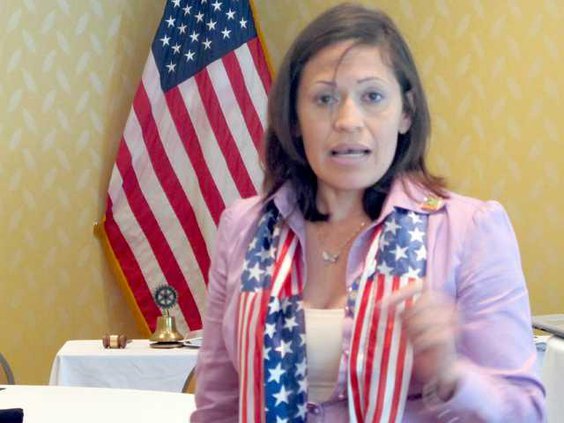Hinesville Rotary Club members heard details and implications of the Affordable Care Act from local business owners and operators during Tuesday’s lunch meeting.
Yvonne Nelson, office manager for Liberty Tax Service, and Cecile McKnight, outreach-and-enrollment specialist with Diversity Health Center, talked about the new national health-care plan, but mostly responded to questions and comments from Rotary members. At times, the discussions became heated.
The guest speakers were introduced by Rotary member Lisette Vila, who is general manager of the LaQuinta Inn & Suites, where the Rotary Club meets every week. She also is the owner of Liberty Tax Service. Vila began by calling the act a “sleeping monster” then noted, “Now it’s here.”
Nelson began a PowerPoint presentation by pointing out that most Americans are mandated by the federal government to have health insurance by Jan. 1, 2014. She said you’re exempted from the mandate if you already have your own health insurance or if the cheapest qualifying health-care plan for you exceeds your household income by 8 percent.
She said if you don’t have a health-insurance plan by Jan. 1, 2014, you’ll pay a $95 penalty or 1 percent of your household income, whichever is greater. The penalty more than doubles in 2015 and doubles again in 2016, she said. The head of household will be liable for each person for whom you claim a personal exemption, she said.
She said one of the biggest changes resulted from the Affordable Care Act is an increase in taxes, especially for those making more than $250,000 a year. Single individuals, heads of households and qualifying widows making more than $200,000 also will see a .9 percent increase in Medicare taxes as well as a 3.8 percent increase in taxes on investment income, she said.
Nelson said most employers with more than 50 employees have been exempted from implementation of the new program until Jan. 1, 2015.
McKnight said her office received a federal grant to help with implementation of the act and to help people enroll in Liberty, Long, McIntosh and Wayne counties.
Rotary member George Holtzman asked about people who don’t have computers and can’t sign up online. David Morris, also with Diversity Health Center, said they have paper applications for these individuals.
McKnight talked about the marketplace exchanges created by the new plan, including federal exchanges, state and federal exchanges and state-based exchanges. She said Georgia is one of the states that chose not to participate in the exchanges.
She spoke extensively about the benefits of the plan. She said it prohibits health-insurance companies from charging a high premium based on gender, extends coverage to dependents up to 26 years old, prohibits discrimination for pre-existing conditions and eliminates annual coverage limitations.
“We’re here to help with the process,” McKnight said. “A lot of people don’t understand health insurance. We’re here to help them.”
As soon as she concluded her presentation, several people at once wanted to comment or ask questions.
“Half the people in this country are really mad about this health-care plan,” Rotary member Jeff Ricketson said. “I don’t understand what they’re so mad about.”
McKnight and Nelson attempted to respond, saying it is due to misinformation provided by the media.
“It looks like a good part of the plan is paid for by an increase in taxes,” said Rotary member Peter Hoffman, who noted those making more than $250,000 probably are the angriest and that most of the people at the meeting probably will not be affected by that tax increase.
“What about those of us who make less than $100,000?” he asked
Morris, McKnight and Nelson tried to assure him that those making less than $100,000 would not see an increase in taxes, but Hoffman noted he would see an increase in his insurance premium and a decrease in coverage.
Rotary member Paul Andreshak said the word “tax” is the key word and the biggest reason for the nationwide anger. He pointed out that Morris had told the club that despite penalties, there still will be individuals who refuse to get insurance.
“If they run this thing the way they do Medicare/Medicaid, we’re in trouble,” Andreshak said.
Holtzman then suggested that the plan’s success seemed doubtful. He said Canada’s socialized medicine is obviously not so good, otherwise Canadians wouldn’t come to this country for health care.
Morris attempted to calm some of the heated commenters but offered little information to change anyone’s mind. He was assisted by Rotary President Marcus Sack, who concluded the meeting.
“Whether we agree with it or not, it’s here,” Sack said.
Rotarians discuss Affordable Care Act
Business owners, manager voice concerns


Sign up for our e-newsletters